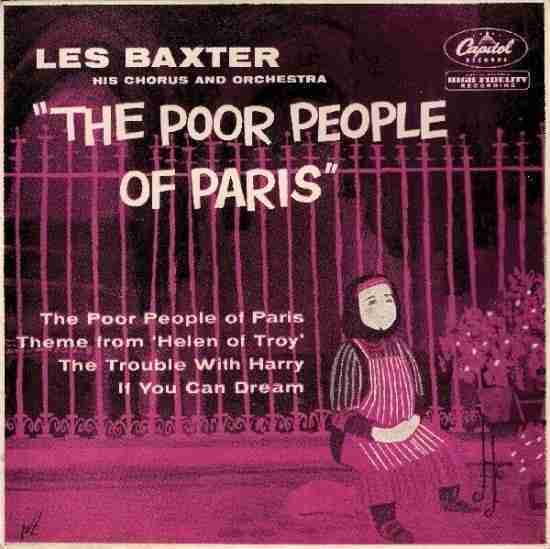I can’t say that I paid much attention to the legacy of Les Baxter until I decided to work on this anthology. I knew he was a bandleader from the 1950’s, but that was about it. When I look at the early 50’s musically for my own enjoyment it is usually Jump Blues or Jazz that I focus on, but the older I get the more appreciation I have for the arrangements and orchestras from men like Les Baxter.
Prior to the Rock and Roll era, Les Baxter had quite the impressive history. This included being the conductor on Nat King Cole’s signature hit, Mona Lisa and later striking out with his own orchestra to have a few hits of his own, most namely an instrumental version of “Unchained Melody”, a song that went to number one over a decade before the Righteous Brothers took that song and ripped that tune apart from anyone else who would ever dare try to record it, or even try to sing it in the shower.[1] Ironically, the version by the Righteous Brothers only went to number four, while Baxter went to the top with it in 1955, though had it not been for Demi Moore, Patrick Swayze and a pot, there would have been a lot of people who never would heard that version either.
Les Baxter may not have the most popular version of “Unchained Melody” anymore, but he still has the most recognized version of “The Poor People of Paris”, a catchy song that as the title suggests, originated in France.
Titled “La Goulante du Pauvre Jean” (translated to “The Ballad of Poor John”) the song would become a major hit in France for Edith Piaf, who is arguably the most important singer of that country’s history. In 1954, American Songwriter, Jack Lawrence wrote English words to the song, though his interpretive words were about the fun loving nature of the Parisian people who loved to sing, dance and of course love as opposed to more serious nature that is was intended in French.[2]
It didn’t really matter, as neither the original French lyrics nor the American translation really mattered to Baxter, as most of his material didn’t have words anyway. What he did do though was capture the fun loving nature of Lawrence’s penmanship and orchestrated what may have been the most fun song of his career. Whistlers replaced the words, but it made it even catchier and it became the type of song that you catch yourself humming all day: even if you hated the song.[3]
Incidentally, this would be the end of Les Baxter’s time at the top of the pop charts and one of the last gasps for music of this kind to reach the number one position as one of the biggest musical difference makers ever is about to be discussed next, and I will wager that you already know who that is.[4]
Still, there is no reason to be sad for Baxter as he still had a very healthy career long after he left the Billboard Charts. Like so many bandleaders, Les Baxter made a good living scoring movies and would have other musical endeavors, one of which was forming a folk group that would have a young member named David Crosby.
Now, it is time to crown the “King” of the era.[5]
Other Notable Songs that charted but did not go to number one in this time period: March 24, 1956 – May 4, 1956
3/24/56: Drown In My Own Tears by Ray Charles did not chart on the Top 100 but would go number one on the R&B Chart.
3/24/56: Smokestack Lightning by Howlin’ Wolf did not chart on the Top 100 but went #5 on the R&B Chart.
4/14/56: Why Do Fools Fall in Love by Frankie Lymon and the Teenagers peaked at #6 and went to the top of the R&B Chart.
4/28/56: Blue Suede Shoes by Elvis Presley went to #20.
4/28/56: One Night by Smiley Lewis did not chart on the Top 100 but did reach #11 on R&B Chart.
[1] Here is some advice. Never sing that song at Karaoke. I don’t care how good a singer you think you are, you can’t touch what Bobby Hatfield did.
[2] Lawrence would enter the Songwriters Hall of Fame in 1975., his most notable hit was “If I Didn’t Care, made popular by The Ink Spots.
[3] Best current example: Taylor Swift’s “Shake It Off”. It is a song you can’t help but hum at the very least…even if you don’t want to!
[4] You have to know who is next right? Who was the biggest star of the 1950’s? Yep, that’s the one!
[5] This is another hint as to who is next for the three of you who hadn’t figured it out from the first hint!





Comments powered by CComment